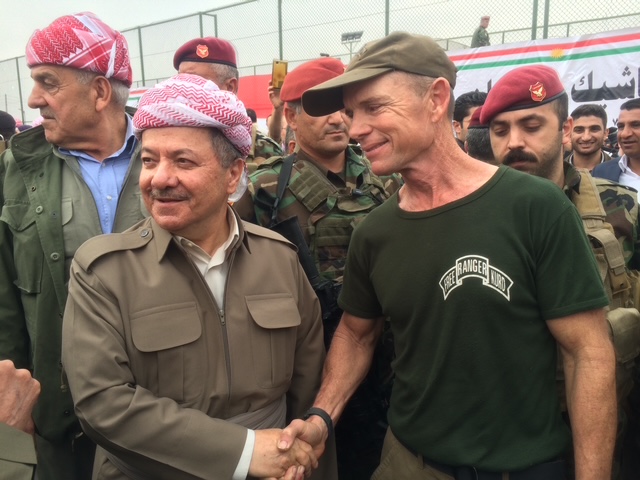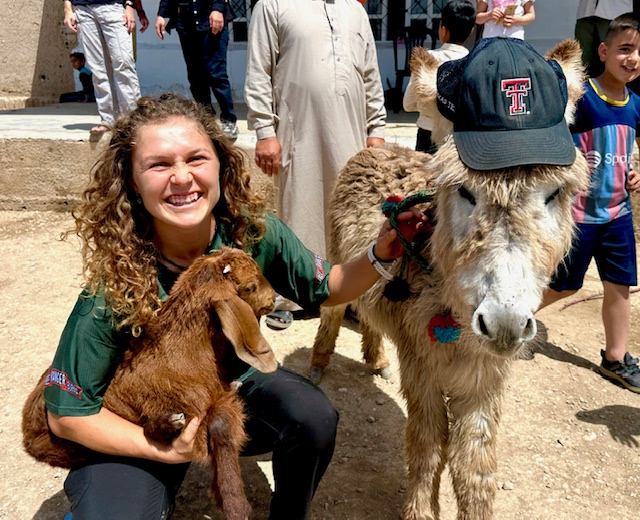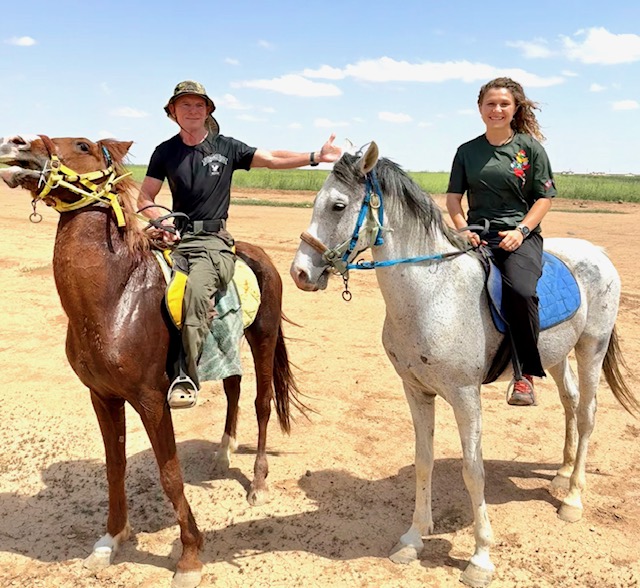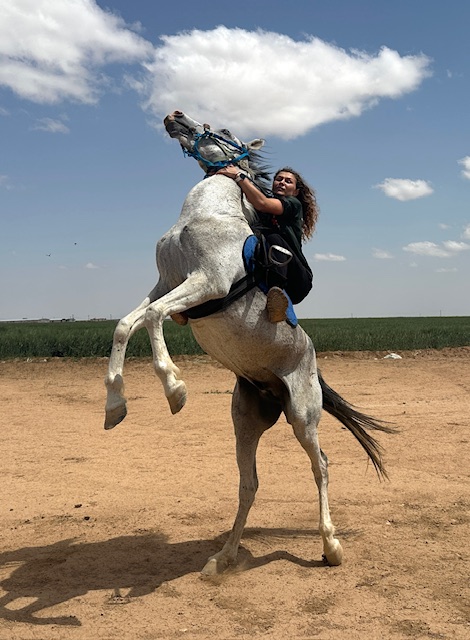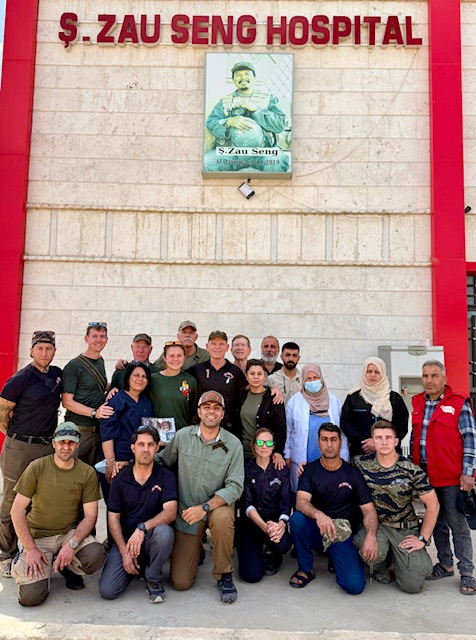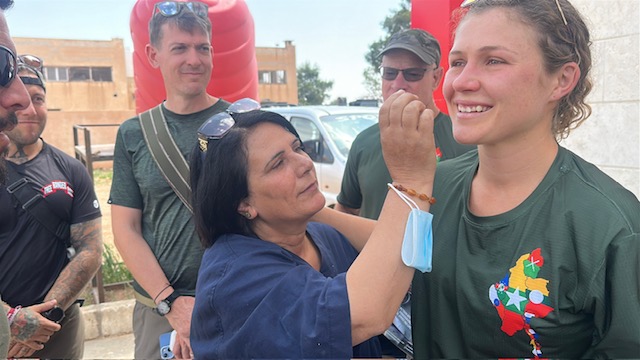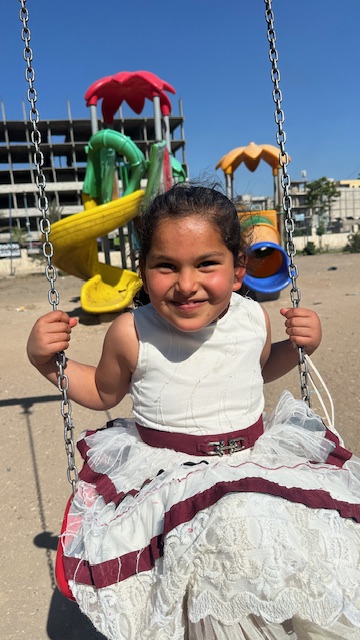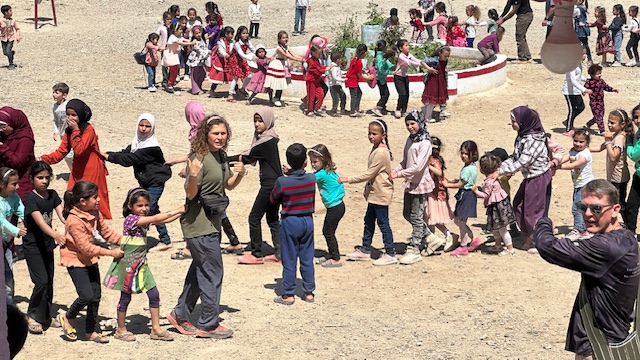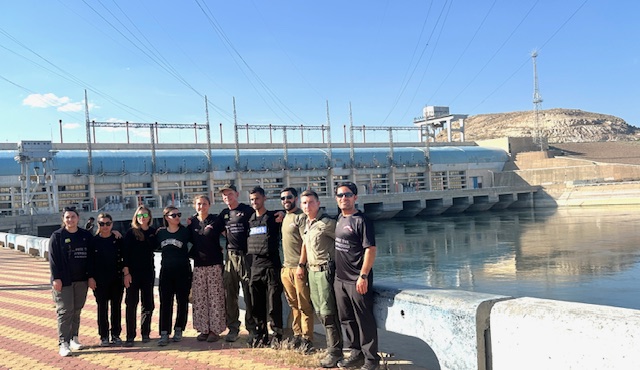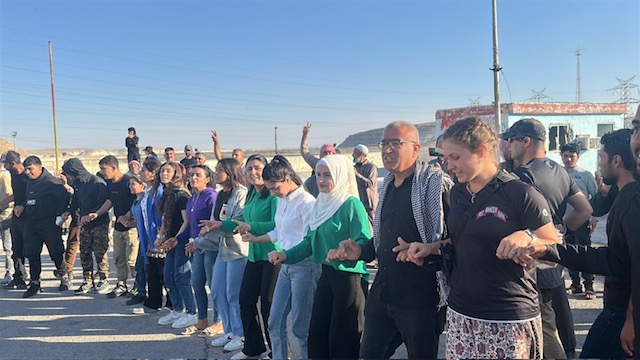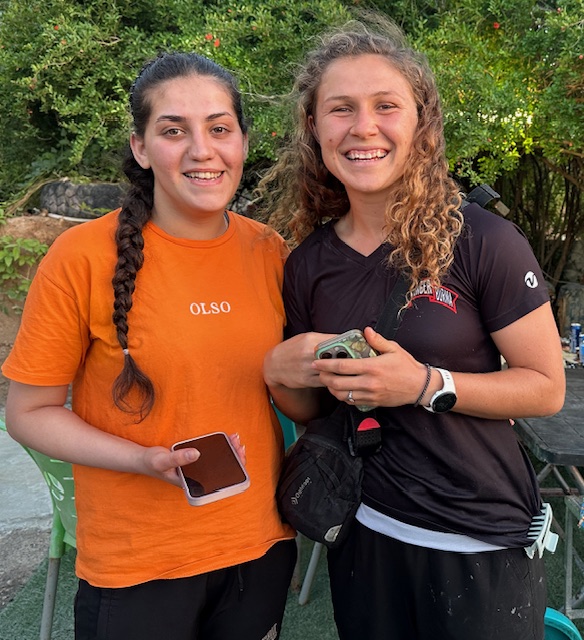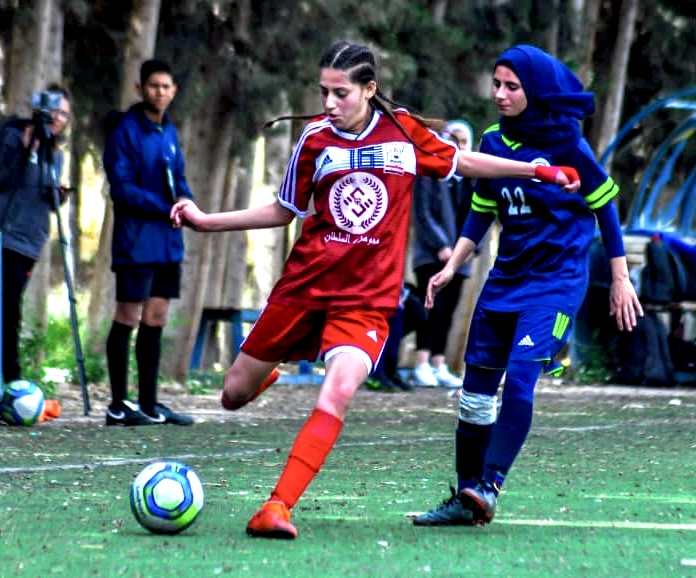17 May 2025
Northeast Syria
“Why did you come?” asked one of the leaders in Raqqa, northeast Syria. I prayed and answered, “Because God sent us and because we love you.” That is why we go to Syria or anywhere, and we thank you all for praying and helping us. This is FBR’s tenth year in the Middle East, with wars, terrorism, political upheaval, hatred, fear, and desperation all creating an ongoing need for help here.
This particular mission into Syria started in Kurdistan, northern Iraq, with the national day of prayer being held in Irbil. With the help of Heather Mercer, we were invited to this prayer conference. Heather is a long-time missionary in the region and one of the Shelter Now mission group (led by George Taubmann) that was captured by the Taliban in Afghanistan in 2001. We are close to the Taubmann family and Heather, and we’re blessed that we could go to this event. Once there, we met many friends from all over the world, including Nadine Maenza, Charmaine Hedding, and others doing wonderful work in Jesus’ name. We also had the opportunity to meet the leaders of Kurdistan: Masoud Barzani, senior leader and past president; his son Masrour, currently the Prime Minister; and his nephew Nechirvan, who is the President.
Our family had met President Nechirvan earlier, and he had helped us gain access into Syria, but we had not seen him for a few years. We had met the senior Barzani, Masoud, in 2016 in the liberation of Basheeqa from ISIS, where he came and congratulated us on our help. We had never met Prime Minister Masrour, and it was a blessing for me, along with my daughter Suuzanne and some of our team members, to be able to meet him. We prayed with him for his country and his leadership. During the prayer conference, I was able to meet with President Nechirvan multiple times and pray with him and also receive his blessing for this next mission into northeast Syria. This enabled us to go with everything we needed.
There are now six major groups controlling different parts of Syria since the fall of Assad and the retreat of the Russians to a few small bases:
1. The Al Qaeda-related Hay’at Tahrir Al-Sham (HTS) control Damascus in the western part of Syria. They are supported by Turkey.
2. The Syrian National Army (SNA), another radical group that is also a proxy of Turkey, control parts of northern Syria as well as the Manbij area in the central Euphrates River Valley.
3. Ahrar al-Sham, who control Idlib, want an ISIS-type caliphate. They receive some support from Turkey.
4. ISIS, while it doesn’t control any territory, is resurgent and attacking in many areas of Syria.
5. The Druze minority with some outside support is clinging to a small portion of southwest Syria.
6. The Syrian Democratic Forces—the only pro-democratic group, that is led by Kurds and includes Christians, Arabs, Yazidis, and others. The SDF is the key partner of the United States and coalition forces since the earlier defeat of ISIS.
Our main mission is on the northeast side of the country controlled by the SDF. The situation in northeast Syria is very tenuous, with ground attacks by ISIS and the SNA, as well as airstrikes and drone strikes by the Turkish air force. From December last year to early this year, there have been deadly pitched battles on the ground and from the air along the Euphrates River. The Tishreen Dam is the key point along the river. It provides electricity and water to communities along the river and is a main crossing point across the river. The SNA, supported by Turkey, made a months-long attack trying to take the Tishreen Dam as well as the bridge west of Manbij, but, despite heavy losses, the SDF held the dam and bridge.
Our FBR team responded at the beginning of the attacks in December, caring for wounded at the dam and helping IDPs who fled to the Raqqa area. Finally, in mid-April this year, a fragile ceasefire was agreed on. In spite of the agreement, there are regular violations, and on this mission, we witnessed a drone strike and heard of four more as we drove along the Euphrates. No large-scale ground attacks have occurred since the ceasefire. In the meantime, the HTS and other forces in western Syria are attacking and killing Alawite and Druze minorities, and everyone feels on edge.
It was into this swirl of events that we crossed the Tigris River into northeast Syria on our most recent mission. The first place we went was to a farm just west of Qamishli where we are friends with a family that took in the donkey Snowflake we had rescued during fighting against ISIS in 2019 (please see ‘Snowflake in the Desert’). At the farm, we reunited with the family and the baby of Snowflake, named Miracle.
At the farm, we conducted a small medical and dental treatment, led by Dr. Shannon and our medic, Blake, for the family and surrounding villagers. We asked them what they thought of the new HTS government in the west. Mohammad, the father of the family, said, “I can’t even let them in my head. They can’t even enter my head. It’s not a conversation.” He made the hand symbol of a long beard, which is how they identify ISIS, and continued, “They are the same as ISIS. It is unthinkable that they could ever be in power, and it makes us very surprised and afraid that they’re on our doorstep again. We defeated ISIS a long time ago, and we’ve lost so many of our family and friends, and it feels terrible to even think about them being in power. We are resolved to stop them.”
This was the first of many conversations, and they all were the same. To the Kurds, Christians, and Arabs we met on this trip, the HTS and SNA are no different than ISIS. From the farm, we went to Tel Tamer, where we had built a hospital named for Zau Seng, one of our FBR team members who was killed here by SNA/Turkish forces in 2019.
On the way, we saw two riders on Arabian stallions racing through the desert. We stopped our vehicles, waved down the riders, and asked if we could ride. They shook their heads and said, “These are very fast and hard to control. If you want to ride, we take no responsibility.”
I smiled and said, “Yes, we want to ride, and we’ll take full responsibility.” We prayed, and then Suuzanne mounted the white stallion and I mounted the bay. We took off. Arabians are called “daughters of the wind,” and if you’ve ever ridden one at full gallop across the desert, you’ll know why. The wind is whistling by your ears, and the speed is incredible. As we flashed by the team on the way back, I felt joy and also gratitude we didn’t fall off!
After I dismounted, Suuzanne stayed on her horse and began to work with it so it would rear up. What a beautiful sight, and this made us new friends. In talking with them, they made it very clear that they had no real ideology except love of God, family, and horses. They hoped that the forces gathering to the west would not come into their area.
After we finished riding, we continued on to Zau Seng Hospital in Tel Tamer. The hospital serves primarily as a maternity hospital, where the sweet staff provide life-giving and life-saving help. As we gathered for a photo in front of the hospital, with Zau’s picture above, Suuzanne began to cry. Zau was like an uncle to her. He had raised her, Sahale, and Peter. Standing next to Suu was Jamila, the chief medical officer who worked with us during the Turkish-backed invasion of 2019. Jamila is a brave woman who lost many of her friends during that offensive.
Jamila knew Suu well from her earliest times in Syria and put her arms around her and hugged her as they both began to cry. And then Jamila reached up and gently brushed away Suuzanne‘s tears. Suuzanne said, “I’m so glad they haven’t forgotten my uncle Zau and that he’s loved and remembered.” From the hospital, we went to Hasaka to visit Dr. Hassan, who is in charge of public health for the region. Dr. Hassan was with us during some of the worst days of the SNA/Turkish invasion, treating hundreds of wounded. We asked him about the current needs, and he laughed as he said, “Thanks for coming, and yes we need everything from bread to a CT scan!” He is making do with what he has, and we pray that they get the help that they desperately need.
We continued to Raqqa, the old capital of ISIS. We visited the church that we helped rebuild after ISIS destroyed it, as well as the playground that Reload Love had helped us build. We met with Abu Omer, the commander of the northern democratic forces in Idlib that were pushed out of Idlib by HTS and others. Abu Omer said, “I don’t need weapons or money. I never asked for that. I need help for a political solution. We need help to stop the radical forces in the west—the HTS and SNA. These are Al-Qaeda and ISIS-based and must not be allowed to take over. We hope the US stands with us.”
We did a Good Life Club program for Abu Omer’s IDP children from Idlib and are helping with food, medicine, an ambulance, a trash truck, and a water truck for these displaced people. From Raqqa, we continued north through Ain Issa (the Eyes of Jesus), where we support the clinic there, and then on to Kobani. On the way, we witnessed a drone strike in front of us. Fortunately, nobody was killed. Normally these strikes are directed against SDF forces, but in this area, it was just families and farms. In spite of the negotiations, these kinds of attacks happen randomly, anywhere, anytime. We continued to the bridge over the Euphrates River that leads to Manbij. Manbij is now controlled by the SNA, and the playgrounds and schools that we helped build have been abandoned and some destroyed. Worse than that, many of our friends have been killed there. The bridge is now the new front line and is littered with destroyed vehicles. The SDF controls the eastern side to stop the SNA from advancing.
From there, we went to Kobani, where we support multiple churches, as well as the Civil Council in providing medical and other relief. We visited some of the Christians and churches we support there. One of the Christians told us he had spent months in the dictator Assad’s prisons, and now because of the jihadi forces in control, the whole country might become a prison.
We prayed together and helped as we could, and from there went on to the Tishreen Dam. The Tishreen Dam area is key terrain. The front lines are just on the west side of the dam, and every building is destroyed. Our FBR medical teams were under those buildings during some of the fighting that took place from December onward, treating wounded and evacuating dead at great risk to themselves. Now, with a very tenuous ceasefire, villagers come every day risking their lives to protest against the SNA/Turkish attacks. On multiple occasions while they were gathered, they’ve been killed by drone and artillery strikes. Still, they come every day, waving flags, singing, and dancing. We were asked to speak and tried to encourage people and also pray for the enemies’ hearts to change. As we spoke, Suuzanne and I were moved to tears, and so were the people with us. An 85-year-old man said that he came here eight times because this was his river, his dam, his water, his electricity. He said he’s willing to risk his life so that he and all can share in it. He thanked us for coming and hugged and kissed us.
Suuzanne sang a Burmese freedom song for the people here. Many began to cry, but when she finished, there were smiles as tears streamed down their faces. It felt like holy ground, and I remembered one of the Kurdish leaders who had been here when the civilians were attacked and killed earlier. He said, “After my initial shock and fear as death rained down on us, I lost all concern because I had a mission. I was here to help people survive and stand for freedom. It felt holy. I can’t explain it. It just felt holy. It wasn’t about pride, revenge or resistance. It was about love and truth.” That’s how we felt as well.
From here, we went back to Raqqa to meet with medical and health department leaders and their families. We had a barbecue by the Euphrates River, and for a moment it felt like there was no war at all. Such is the resilience and love of the people. From Raqqa, we went to meet General Mazloum Abdi, the commander of the SDF. He’s an old friend, and we became close after Zau was killed in 2019. He greeted us warmly and asked about Sahale and Peter, who are now back at school at Texas A&M. Suuzanne represented the family and shared Romans 12:21, “Be not overcome by evil but overcome evil with good.” We talked and prayed together and affirmed our love and support for him. We said, “We are very small, but we serve a big God who loves you and will lead you as you listen to him. We are behind you in love and whatever service we can give.”
General Mazloum told us how grateful he was for deeper friendships with the Kurdish government in Iraq and with the leadership there. He said, “It’s been 70 years we have been apart, now we are going closer together in friendship. This is the right time.” He also expressed his concern about the radical forces in the west. He said that the SDF are negotiating with them, but they will not allow their freedoms and lives to be taken away. He also wants to find ways to be friends with Turkey, and we pray for that. General Mazloum looked at us with kind eyes as he asked, “Please keep praying for us.”
On our last days, we had multiple meetings, but one of the most moving was with a young lady named Khadijah, who was on the Syrian national soccer team. She’s 19 years old, but because the HTS has taken over Damascus, and with the mass killings of Druze, Alawites, and others, she cannot go play the sport she loves. This was her dream. She was heartbroken, and we encouraged her to call on Jesus, who cares for her and her life.
Suuzanne comforted her with her own story of playing rugby, but then giving it back to God and not thinking she’d be able to play again after an injury—then being invited to join the Thai national team in between missions in Burma, a miracle. She told Khadijah, “You can trust God with the passions that God put inside you. God gives good gifts, even though we don’t always know what they will look like.” For now, even though she cannot play, she is safe in northeast Syria. We pray that countries that love liberty can stand with her and her people so that freedom will spread throughout all Syria.
We are grateful for the leadership of the Kurdish Regional Government and SDF that allows us to come and help in small ways. We ask God’s blessings on them and all here in Jesus’ name.
God bless you,
Dave, family and team



